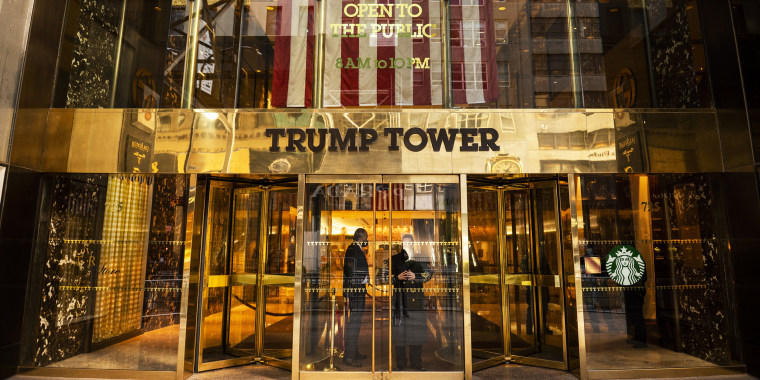UPDATE (Jan. 13, 2023, 9:30 a.m. ET): The Trump Organization was fined $1.6 million by a New York judge on Friday for running a 15-year tax fraud scheme that prosecutors said was orchestrated by top executives, including former Chief Financial Officer Allen Weisselberg.
During a 2016 presidential debate, Donald Trump said he didn’t pay taxes because he’s “smart.”
Turns out, he also doesn’t pay taxes because he cheats — or at least, his organization does. And if his brand can be convicted, then maybe so can he.
During a 2016 presidential debate, Donald Trump said he didn’t pay taxes because he’s “smart.”
On Tuesday, a New York jury returned a verdict against the Trump Organization, finding the former president’s company guilty on 17 counts of tax fraud and related crimes. The scheme involved providing certain employees with untaxed benefits, such as Manhattan apartments, luxury cars, private school tuition and cash bonuses. Employees and the company failed to disclose those payments on tax returns, making them a form of hidden compensation.
While the verdict was technically against a Trump corporate entity, it also stains the Trump family. During the trial, the prosecution presented evidence that Donald Trump himself personally paid for tuition for the grandchildren of Chief Financial Officer Allen Weisselberg, who pleaded guilty for his role in the scheme and testified at trial. The evidence also showed that Trump approved a salary reduction that matched the value of benefits provided to another employee. In his closing argument, prosecutor Joshua Steinglass argued that this evidence showed Trump was “explicitly sanctioning tax fraud.”
Corporations may be found guilty of crimes when two factors are met. First, the misconduct must be committed by high-level executives with the authority to act on behalf of the company. Second, the misconduct must have been committed at least in part to advance the interests of the company. By finding the Trump Organization guilty, the jury found that untaxed fringe benefits to corporate executives benefited the company as well as the employees.
But the verdict is significant by other measures. For one thing, it achieves some measure of accountability. And it sends the message that some cheaters, at least, are eventually caught.
The scheme described by prosecutors benefitted company employees by artificially reducing the taxable income they needed to declare on their personal income tax returns. In exchange for a lower salary, they received undeclared perks. The scheme also benefited the Trump Organization. By providing unreported benefits to certain employees, the organization made it appear that the total compensation for those employees was lower than it actually was. The lower tax bill cheated the people of New York out of their rightful tax revenue. The scheme also cheated other companies in the real estate industry with whom the Trump Organization competes. Every dollar the Trump Organization saves in tax liability can be used to obtain a competitive advantage in the marketplace. The guilty verdict says that society will not tolerate companies that conceal taxable income to game the system.
Within the business world, the conviction will bring reputational harm to Trump, who has seemingly evaded this type of accountability for years.
But the verdict also speaks volumes about Trump himself. In a company that is privately owned and run primarily by Trump and his two oldest sons, the Trump Organization is a corporate alter-ego of sorts for Trump. Prosecutors called him a “hands-on boss” who was closely involved in the company’s decisions.
Within the business world, the conviction will bring reputational harm to Trump, who has seemingly evaded this type of accountability for years. Outside of the C-Suite, accountability remains elusive. Trump managed to avoid criminal charges for obstruction of justice in the investigation conducted by special counsel Robert Mueller. He survived two impeachment trials in the Senate. To date, he has avoided civil liability for the alleged rape and defamation of writer E. Jean Carroll, and for the alleged payments to women as hush money shortly before the 2016 presidential election. He sometimes seems untouchable. Trump once famously said he could “stand in the middle of Fifth Avenue and shoot somebody and I wouldn’t lose voters.” That perception is at least a little less powerful now.
Of course, loyal members of Trump’s base likely won’t care about the conviction. Or if they do, they will become further enraged that he has been victimized once again by coastal elites. But Tuesday’s verdict shows that even in light of the very high standard of guilt required in criminal cases, a random group of 12 jurors can find unanimously that Trump’s namesake company is guilty of a crime — and not just one crime, but 17 of them.
Prosecutors who are investigating the former president should be emboldened upon learning that jurors can be found who will return a guilty verdict against a former president — or at least his company.
Perhaps the dam of invincibility is breaking. Government lawyers who are investigating Trump, such as special counsel Jack Smith, Fulton County, Ga., District Attorney Fani Willis and New York Attorney General Letitia James may be able to take advantage of the deluge and finally hold Trump accountable. No matter how “smart” he may be.

